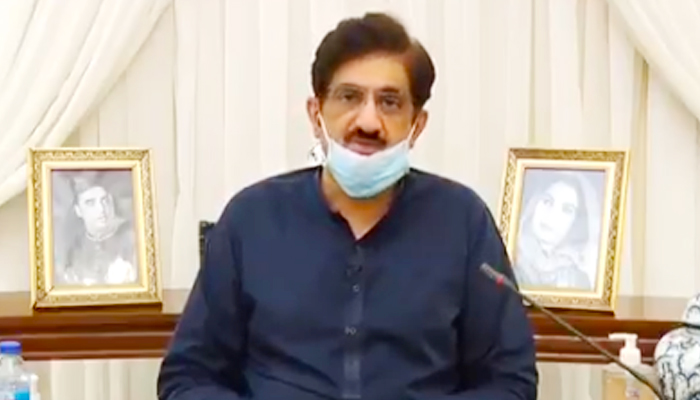Sindh limits taraweeh prayers as coronavirus cases increase
He said that Friday prayers and taraweeh prayers by the people at large must be observed at home
KARACHI: Chief Minister Sindh Murad Ali Shah late Thursday night announced that the taraweeh prayers will only be offered by mosque's administration.
CM Sindh, in a video message on Twitter, said that Friday and taraweeh prayers by the people at large must be observed at home.
The chief minister said that he had spoken to President Arif Alvi in this regard and had received his nod for the decision. "The president said it is up to the provincial government," said Shah.
Shah said taking such "difficult decisions" are a government's responsibility and this decision was taken especially keeping in mind doctors' recommendations.
The provincial chief also announced that, on Friday, a complete lockdown would be imposed in the province during 12-3pm to curb the spread of the virus.
Earlier in the day, President Alvi had sought to remind everyone that there are certain conditions under which congregational prayers have been allowed in mosques under the 20-point agreement reached between the ulema and the government.
In a tweet, President Alvi said: "All those concerned about the SOPs regarding prayers in mosques and responsibilities of implementation [...] please read the following."
President Alvi underscored that whereas the ulema have fully entrusted the provincial governments to implement their lockdowns or decide on conditions under which prayers will be held in mosques, people are nonetheless reminded that they are urged "to pray at home".
'We are running out of beds'
On Wednesday, a group of Karachi's leading doctors, belonging to the Pakistan Medical Association had painted a sobering picture of the on-the-ground realities faced by frontline workers in the fight against the coronavirus.
Urging the government and religious leaders to continue to abide by recommended precautions instead of easing restrictions, they warned a point will otherwise come when they will have to choose between one of two patients to save.
Dr Abdul Bari, who is the CEO of Indus Hospital, had said that the arrival of Ramadan, which had prompted the government to review the measures taken and subsequently ease restrictions, had resulted in a surge in cases.
"This led to great anger and stress in the doctor community as they are the experts in this situation [and must be heard]," said Bari, adding: "All of Karachi's medical facilities are now almost full to the brim with patients."
Dr Saad Niaz. a gastroenterologist at the Dow University of Health Sciences, echoing Dr Bari's sentiments had said wards are "already 80% saturated" and that "there are more patients who are under 60 years of age".
Dr Niaz had also drawn attention to the fact that more and more doctors are getting affected, with as many as 162 who had already fallen prey to the disease from Sindh.
"We will have great difficulty in the coming days such as refusal to admit patients because of no beds," he said.
The DUHS doctor explained that the country's current capacity had so far sustained the volume of patients "because due to a lockdown in place, they were only trickling in".
"Projected figures stand at 70,000 and if even 10% of those are serious cases, we don't even have the capacity to accommodate those. There are no ventilators."
"Our only option is to be aggressive with precautions," Dr Niaz had stressed.
-
Security forces gun down 30 terrorists in multiple IBOs in KP: ISPR
-
MQM-P calls for new province in Sindh
-
US report validates Pakistan military edge over India: PM
-
Banned TTP poses serious threat to Pakistan security: UNSC panel
-
CM Afridi clarifies remarks on by-poll after ECP requests army deployment
-
Dubai sees 3.2m Pakistani passengers in 2025 as airport sets new milestone
-
Security forces kill 23 Indian proxy terrorists in KP's Kurram
-
Pakistan to construct island to boost oil exploration: report












